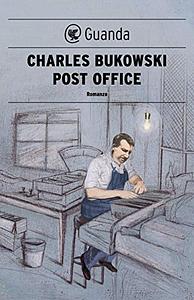Take a photo of a barcode or cover
funny
lighthearted
reflective
relaxing
fast-paced
Plot or Character Driven:
Character
Strong character development:
No
Loveable characters:
No
Diverse cast of characters:
No
Flaws of characters a main focus:
Yes
To my knowledge, "Post Office" represents the second of three semi-autobiographical novels by Bukowski. Sandwiched between "Ham on Rye," which depicts the author's childhood through young adulthood, and "Women," which depicts the author's later years as a successful writer, "Post Office" describes the long period between those two stages of his life. Bukowski irreverently toils away in mundane bureaucracy as a postal worker, drinks too much, pursues women, and gambles at horse tracks. As one might expect, his personality and behavior are somewhere between what they are in "Ham on Rye" and "Women"--he seems slightly more mature than he was in the former (best showcased in his description of fatherhood) and not quite the lecherous drunk that he will become in the latter. At the same time, he's still a terrible person--his writing is racist (as in "Women," he describes multiple people as "high yellow[s]") and his treatment of women is criminal. He describes women as "good solid meat"; and, in Part One, ch. 14, he recounts raping a woman while delivering mail. If "Ham on Rye" represents Bukowski as a lecherous, irreverent low life, and "Women" represents him as a tiring, criminal piece of shit, "Post Office" shows a Bukowski that is unfortunately closer to the latter.
"Post Office" is a quick read--I read it in a weekend, but it could definitely be finished in one sitting. 196 pages, mostly dialogue, and noncomplex scenes (effectively, the same scenes over and over again--Bukowski getting written up at the post office for violating their seemingly arbitrary rules; Bukowski going to the tracks and winning; the arc of a relationship). Like "Women," "Post Office" has a repetitive feel to it; Bukowski's character is pretty clear, and his behavior is, as a result, never unexpected. Still, there are some funny scenes (his visit to Texas with his first wife, Joyce); and his honesty and directness can seem refreshing (he always seems supportive, never seems envious), in light of his other failings. I wish the book featured someone who changed him; allowed him continue to be a piece of shit, but helped him no longer be a racist and sexist. Since I'd read "Women" before this book, I knew not to expect that. Still, reading Bukowski leaves me disappointed that his cynicism and irreverence aren't just part of an honest perspective (as they might be with other writers), but toxic and hurtful.
"Post Office" is a quick read--I read it in a weekend, but it could definitely be finished in one sitting. 196 pages, mostly dialogue, and noncomplex scenes (effectively, the same scenes over and over again--Bukowski getting written up at the post office for violating their seemingly arbitrary rules; Bukowski going to the tracks and winning; the arc of a relationship). Like "Women," "Post Office" has a repetitive feel to it; Bukowski's character is pretty clear, and his behavior is, as a result, never unexpected. Still, there are some funny scenes (his visit to Texas with his first wife, Joyce); and his honesty and directness can seem refreshing (he always seems supportive, never seems envious), in light of his other failings. I wish the book featured someone who changed him; allowed him continue to be a piece of shit, but helped him no longer be a racist and sexist. Since I'd read "Women" before this book, I knew not to expect that. Still, reading Bukowski leaves me disappointed that his cynicism and irreverence aren't just part of an honest perspective (as they might be with other writers), but toxic and hurtful.
Short, misogynistic and a bit dull. I know this book is a 70s classic but it doesn't stand the test of time. Culture and mores have moved on so significantly that this book just looks like a fossil.
The main character- Chinaski (is that for real?) hates work but loves drinking and fucking, lands a job in the US post office and does a little work, plenty of drinking and seems irresistible to women so there's plenty of fucking. Then he marries, becomes a father, divorces and loses his job. The end.
There's not a single moment of introspection in the book. The character development is lamentable. We know next to nothing about any of the women including his wife.
The main character- Chinaski (is that for real?) hates work but loves drinking and fucking, lands a job in the US post office and does a little work, plenty of drinking and seems irresistible to women so there's plenty of fucking. Then he marries, becomes a father, divorces and loses his job. The end.
There's not a single moment of introspection in the book. The character development is lamentable. We know next to nothing about any of the women including his wife.
dark
funny
sad
fast-paced
Plot or Character Driven:
Character
Strong character development:
No
Loveable characters:
No
Diverse cast of characters:
No
Flaws of characters a main focus:
Yes
dark
funny
reflective
fast-paced
Plot or Character Driven:
Character
Flaws of characters a main focus:
Yes
Charles Bukowski’s first novel which reads exactly as expected. Bukowski can get a little sentimental from time to time in his poetry; I wondered how frequently it would come up in prose. (Not very often.)
At times amusing, it hasn’t aged super well but it wasn’t meant to. This is a slice of historical counter culture American life with a loose focus on working at the post office. Notably, the post office hasn’t changed much since Bukowski was working there. Not a must read but interesting nonetheless.
Henry Chinaski ist Trinker und Liebhaber und er investiert sein Geld in Pferdewetten. Zu diesen nachvollziehbaren Leidenschaften kommt als weitere: seine Arbeit bei der Post. Trotz schwieriger Arbeitsbedingungen, absurden Vorschriften und wiederholten Konflikten mit Vorgesetzten, gelingt es dem Protagonisten nicht, dem Postdienst dauerhaft den Rücken zu kehren. Er ist ein Einzelgänger und Außenseiter, der versucht sein Glück zu finden, sich letztlich aber doch immer nur durchschlagen kann. Das Buch enthält einen Batzen Gesellschaftskritik, die nicht belehrend wirkt, weil hier Bukowski schreibt. Seine Sprache ist rüde und direkt und macht das Buch stellenweise sehr witzig und stilvoll.
fast-paced
dark
funny
lighthearted
fast-paced
Plot or Character Driven:
A mix
Strong character development:
Yes
Loveable characters:
No
Diverse cast of characters:
No
Flaws of characters a main focus:
Yes
dark
funny
fast-paced
Plot or Character Driven:
Character
Strong character development:
No
Loveable characters:
No
Diverse cast of characters:
No
Flaws of characters a main focus:
Yes
I didn't realize this was based on Bukowsi's experience working for the post office until I finished the book and googled whether he had. He wields the bureaucratic language like someone intimately familiar. Chinaski is, of course, an unlikeable brute like Bukowsi himself. You can't go into a Bukowsi book expecting anything else. He's a misogynist and a drunk, but there are also simple moments of humanity and vulnerability that makes me sypathize just a little bit. I did genuinely find this book funny--Bukowsi is great at pinpointing the absurd.
Ein Sexist war Bukowski eindeutig. Daran kann man beim Lesen von "Post Office" eigentlich keinen Zweifel haben. Vermutlich war er auch sonst kein wirklich netter Mensch. (Bei der hier nicht sehr gewagten Annahme, dass Erzähler und Autor weitestgehend identisch sind.) Aber in seiner Sprache ist etwas Hypnotisierendes, gerade durch die bescheidene Simplizität. Einfach ist auch der Inhalt. Episode um Episode beschreibt Bukowski seine 3 + 12 Jahre bei der amerikanischen Post und seine Beziehungen zu einigen Frauen in dieser Zeit. Nichts spektakuläres, alles relativ ziellos und ohne Moral. Aber damit auch lebensnah und glaubwürdig. Besser direkt auf Englisch lesen.




